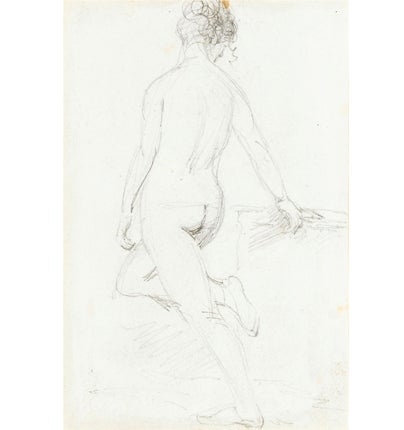Exposed for public view, Constable's rude period
Sketch was considered too risqué for Victorian standards of morality

Your support helps us to tell the story
From reproductive rights to climate change to Big Tech, The Independent is on the ground when the story is developing. Whether it's investigating the financials of Elon Musk's pro-Trump PAC or producing our latest documentary, 'The A Word', which shines a light on the American women fighting for reproductive rights, we know how important it is to parse out the facts from the messaging.
At such a critical moment in US history, we need reporters on the ground. Your donation allows us to keep sending journalists to speak to both sides of the story.
The Independent is trusted by Americans across the entire political spectrum. And unlike many other quality news outlets, we choose not to lock Americans out of our reporting and analysis with paywalls. We believe quality journalism should be available to everyone, paid for by those who can afford it.
Your support makes all the difference.In an age when even an uncovered piano leg could cause moral offence to prudish Victorian sensibilities, one art-lover thought better than openly to display a pencil drawing he had acquired by the English artist John Constable, featuring the bare bottom of a female nude.
Instead, he put it in his album of Constable works, but pasted over it a dinner invitation that he had received by the Royal Academy dated Saturday 29 April 1826.
And there might the drawing – innocent by today's standards – have remained were it not for the curiosity of the new owner of the album. William Dalby, a British art dealer, bought it in an auction in 1971 and began trying to uncover the identity of the collector who had originally put together the album of drawings.
Caroline Oliphant, the group director of pictures at Bonhams – where the sketch is to be auctioned openly for the first time since 1972, said Mr Dalby bought the album for £9,000 at Sotheby's. "When he removed the glued invitation on top, it revealed a bonus Constable sketch which Mr Dalby imagined was pasted over because someone did not approve of it, although a more innocent drawing is hard to imagine," she said.
Luckily, the sketch, which may date from as early as 1808, was undamaged by the glue that had been applied over it. The album is believed to have belonged to the aristocrat Mrs Ridley Colbourne, after whom it is now named. Shortly after discovering the Constable, Mr Dalby put all the sketches on show at a London gallery in 1972. The nude has not been on public view since. It is expected to fetch about £6,000.
Although Constable was known and celebrated as a landscape artist, he was an accomplished portrait artist. Last year, the National Portrait Gallery staged an exhibition of Constable's portrait works. He occasionally drew sketches of nude figures, as part of his ongoing study of the human form.
"Nude drawings by Constable are not unknown. There are others out there," Mrs Oliphant said. "What's curious about this is the stance taken by its owner that this drawing was too inappropriate to display openly in an album."
Sexual prudence in art reached a high state of vigilance during the Victorian period, and exposure of the body was one of the most controversial issues in the art of the time. There were a number of classical and Italian Renaissance paintings of nudes which were doctored so that fig leaves covered what had before been exposed genitalia, while parts of naked sculptures were also covered up. Ironically, the nude was also considered to be the most prestigious and pure form of art, while at the same time vilified because of its incitement to unregulated sexual activity.
"When you get to a stage of covering a table or a piano leg, heaven forbid that you have easy access to a picture of a nude woman in your album," said Mrs Oliphant. "It's not surprising that this was pasted over, although it's ironic because it's such a beautiful study of the human form."
Join our commenting forum
Join thought-provoking conversations, follow other Independent readers and see their replies
Comments